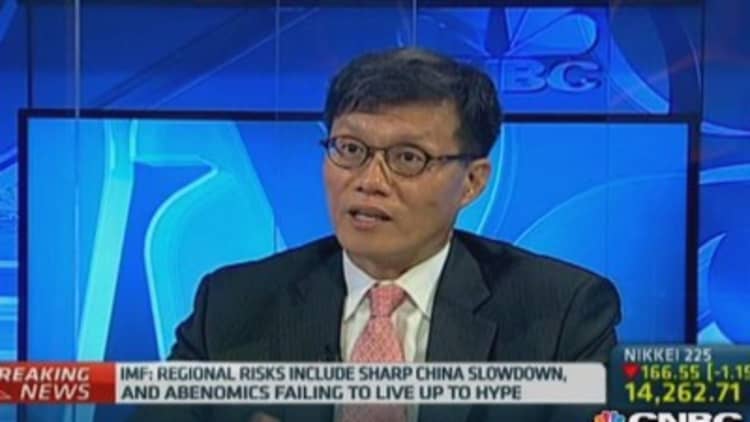
A sharper-than-expected slowdown in China due to financial sector vulnerabilities coupled with the failure of Abenomics to sustainably turnaround Japan's economy are two main risks to Asia's economic outlook, the International Monetary Fund (IMF) said.
Nevertheless, the IMF expects growth in Asia to remain steady at 5.4 percent this year, up from an earlier 5.3 percent forecast, before improving slightly to 5.5 percent next year. Last year, the region grew 5.2 percent.
Asia also faces risks originating from outside the region it warned, noting a sudden or sharper-than-anticipated tightening of global financial conditions remains a threat.
Read MoreWeek ahead for Asia: BOJ decision, China PMI
"As growth in the United States improves, global interest rates will rise and Asia will face a further tightening in financial conditions," the IMF said.
"Bouts of capital flow and asset price volatility are likely along the way with exchange rates, equity prices, and government bond yields affected by changes in global risk aversion and capital flows," it said.
However, the fund says a pickup in external demand alongside a recovery in advanced economies and resilient domestic demand should continue to support growth across most of the region.
"The advanced economies are turning a corner and many Asian economies which depend on exports as a main growth engine are in a good position to capitalize on the recovery. That's the main reason why we are positive on the Asian region," Changyong Rhee, director, Asia and Pacific Department, IMF told CNBC on Monday.
China threat
In China, growth is expected to slowly decelerate to 7.5 percent in 2014 and 7.3 percent in 2015 to a "more sustainable path", the fund said.
Read MoreCNBC Explains: Chinese shadow banking crisis
However, the nonbank financial intermediaries - or the shadow banking system - represent a key source of systemic risk for the world's second-largest economy, it warned, noting that strains have already been seen in the default of some trust products this year. In February, for example, a high-yield investment product issued by Jilin Province Trust Co Ltd and backed by high-interest loans to a struggling coal producer failed to repay investors on maturity.
High local government debt is another potential systemic issue that could amplify vulnerabilities and lead to a deterioration of banks' asset quality, it added. Local government debt is equivalent to a little more than 30 percent of gross domestic product (GDP), compared to 25 percent of GDP at the end of 2010, according to China's National Audit Office .
"Looking ahead, there is likely to be continued news of credit problems among the trusts or potential debt servicing problems among local governments. As in recent months, this could spark adverse financial market reaction both in China and globally," the IMF said.

Furthermore, while structural reforms hold the promise of sustainable and balanced growth, their transitional costs could also weaken activity in the near-term, it said.
Abenomics in question
In Japan, there is a risk that policy measures could prove less effective than envisaged in terms of supporting growth, failing to increase nominal wages, sustaining the recent increase in inflation expectations, or boosting private investment, the IMF said.
It's been about 18 months since Prime Minister Shinzo Abe announced his economic revival plan - dubbed Abenomics - to pull Japan out of deflationary spiral and low growth.
"The first phase of Abenomics has gone well-monetary and fiscal stimulus and exchange rate depreciation have helped growth and caused inflation expectations to pick up. However, a successful transition to self-sustained, deflation-free growth remains uncertain," it said.
Read MoreIs Japan winning the war against deflation?
"Without additional reforms, Japan risks falling back into lower growth and deflation, a further deterioration in the fiscal situation, and an overreliance on monetary stimulus with negative consequences for the region," it added.
The IMF expects Japan's economy to grow 1.4 percent in 2014, before slowing to 1 percent in 2015.


